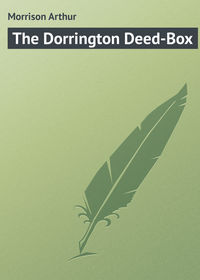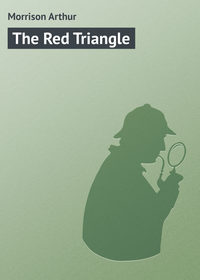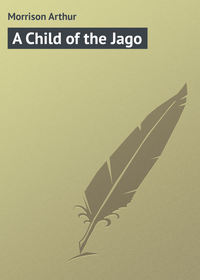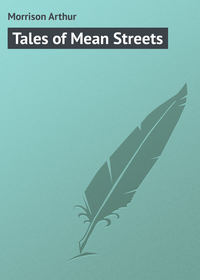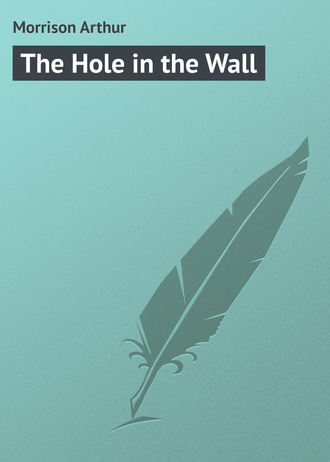 полная версия
полная версияThe Hole in the Wall
"Here he is," said my grandfather, with a deal of pride in his voice, putting his foot on a stool and lifting me on his knee. "Here he is, an' a plucked 'un; ain't ye, Stevy?" He rubbed his hand over my head, as he was fond of doing. "Plucked? Ah! Why, he was agoin' to keep house all by hisself, with all the pluck in life, till his father come home! Warn't ye, Stevy boy? But he's come along o' me instead, an' him an' me's goin' to keep the Hole in the Wall together, ain't we? Pardners: eh, Stevy?"
I think I never afterwards saw my grandfather talking so familiarly with his customers. I perceived now that there was another in the bar in addition to Mr. Cripps; a pale, quiet, and rather ragged man who sat in an obscure corner with an untouched glass of liquor by him.
"Come," said my grandfather, "have one with me, Mr. Cripps, an' drink the new pardner's health. What is it? An' you – you drink up too, an' have another." This last order Grandfather Nat flung at the man in the corner, just in the tones in which I had heard a skipper on a ship tell a man to "get forrard lively" with a rope fender, opposite our quay at Blackwall.
"I'm sure 'ere's wishin' the young master every 'ealth an' 'appiness," said Mr. Cripps, beaming on me with a grin that rather frightened than pleased me, it twisted the nose so. "Every 'ealth and 'appiness, I'm sure!"
The pale man in the corner only looked up quickly, as if fearful of obtruding himself, gulped the drink that had been standing by him, and receiving another, put it down untasted where the first had stood.
"That ain't drinkin' a health," said my grandfather, angrily. "There – that's it!" and he pointed to the new drink with the hand that held his own.
The pale man lifted it hurriedly, stood up, looked at me and said something indistinct, gulped the liquor and returned the glass to the counter; whereupon the potman, without orders, instantly refilled it, and the man carried it back to his corner and put it down beside him, as before.
I began to wonder if the pale man suffered from some complaint that made it dangerous to leave him without a drink close at hand, ready to be swallowed at a moment's notice. But Mr. Cripps blinked, first at his own glass and then at the pale man's; and I fancy he thought himself unfairly treated.
Howbeit his affability was unconquerable. He grinned and snapped his fingers playfully at me, provoking my secret indignation; since that was what people did to please babies.
"An' a pretty young gent 'e is too," said Mr. Cripps, "of considerable personal attractions. Goin' to bring 'im up to the trade, I s'pose, Cap'en Kemp?"
"Why, no," said Grandfather Nat, with some dignity. "No. Something better than that, I'm hopin'. Pardners is all very well for a bit, but Stevy's goin' to be a cut above his poor old gran'father, if I can do it. Eh, boy?" He rubbed my head again, and I was too shy, sitting there in the bar, to answer. "Eh, boy? Boardin' school an' a gentleman's job for this one, if the old man has his way."
Mr. Cripps shook his head sagaciously, and could plainly see that I was cut out for a statesman. He also lifted his empty glass, looked at it abstractedly, and put it down again. Nothing coming of this, he complimented my personal appearance once more, and thought that my portrait should certainly be painted, as a memorial in my future days of greatness.
This notion seemed to strike my grandfather rather favourably, and he forthwith consulted a slate which dangled by a string; during his contemplation of which, with its long rows of strokes, Mr. Cripps betrayed a certain anxious discomfort. "Well," said Grandfather Nat at length, "you are pretty deep in, you know, an' it might as well be that as anything else. But what about that sign? Ain't I ever goin' to get that?"
Mr. Cripps knitted his brows and his nose, turned up his eyes and shook his head. "It ain't come to me yet, Cap'en Kemp," he said; "not yet. I'm still waiting for what you might call an inspiration. But when it comes, Cap'en Kemp – when it comes! Ah! you'll 'ave a sign then! Sich a sign! You'll 'ave sich a sign as'll attract the 'ole artistic feelin' of Wapping an' surroundin' districks of the metropolis, I assure you. An' the signs on the other 'ouses – phoo!" Mr. Cripps made a sweep of the hand, which I took to indicate generally that all other publicans, overwhelmed with humiliation, would have no choice but straightway to tear down their own signs and bury them.
"Umph! but meanwhile I haven't got one at all," objected Grandfather Nat; "an' they have."
"Ah, yes, sir – some sort o' signs. But done by mere jobbers, and poor enough too. My hart, Cap'en Kemp – I respect my hart, an' I don't rush at a job like that. It wants conception, sir, a job like that – conception. The common sort o' sign's easy enough. You go at it, an' you do it or hexicute it, an' when it's done or hexicuted – why there it is. A ship, maybe, or a crown, or a Turk's 'ed or three cats an' a fryin' pan. Simple enough – no plannin', no composition, no invention. But a 'ole in a wall, Cap'en Kemp – it takes a hartist to make a picter o' that; an' it takes study, an' meditation, an' invention!"
"Simplest thing o' the lot," said Captain Nat. "A wall, an' a hole in it. Simplest thing o' the lot!"
"As you observe, Cap'en Kemp, it may seem simple enough; that's because you're thinkin' o' subjick, instead o' treatment. A common jobber, if you'll excuse my sayin' it, 'ud look at it just in that light – a wall with a 'ole in it, an' 'e'd give it you, an' p'rhaps you'd be satisfied with it. But I soar 'igher, sir, 'igher. What I shall give you'll be a 'ole in the wall to charm the heye and delight the intelleck, sir. A dramatic 'ole in the wall, sir, a hepic 'ole in the wall; a 'ole in the wall as will elevate the mind and stimilate the noblest instinks of the be'older. Cap'en Kemp, I don't 'esitate to say that my 'ole in the wall, when you get it, will be – ah! it'll be the moral palladium of Wapping!"
"When I get it," my grandfather replied with a chuckle, "anything might happen without surprisin' me. I think p'rhaps I might be so startled as to forget the bit you've had on account, an' pay full cash."
Mr. Cripps's eyes brightened at the hint. "You're always very 'andsome in matters o' business, Cap'en Kemp," he said, "an' I always say so. Which reminds me, speakin' of 'andsome things. This morning goin' to see my friend as keeps the mortuary, I see as 'andsome a bit o' panel for to paint a sign as ever I come across. A lovely bit o' stuff to be sure – enough to stimulate anybody's artistic invention to look at it, that it was. Not dear neither – particular moderate in fact. I'm afraid it may be gone now; but if I'd 'a 'ad the money – "
A noise of trampling and singing without neared the door, and with a bang and a stagger a party of fresh customers burst in and swept Mr. Cripps out of his exposition. Two were sun-browned sailors, shouting and jovial, but the rest, men and women, sober and villainous in their mock jollity, were land-sharks plain to see. The foremost sailor drove against Mr. Cripps, and having almost knocked him down, took him by the shoulders and involved him in his flounderings; apologising, meanwhile, at the top of his voice, and demanding to know what Mr. Cripps would drink. Whereupon Grandfather Nat sent me back to the bar-parlour and the little ship, and addressed himself to business and the order of the bar.
And so he was occupied for the most of the evening. Sometimes he sat with me and taught me the spars and rigging of the model, sometimes I peeped through the glass at the business of the house. The bar remained pretty full throughout the evening, in its main part, and my grandfather ruled its frequenters with a strong voice and an iron hand.
But there was one little space partitioned off, as it might be for the better company: which space was nearly always empty. Into this quieter compartment I saw a man come, rather late in the evening, furtive and a little flustered. He was an ugly ruffian with a broken nose; and he was noticeable as being the one man I had seen in my grandfather's house who had no marks of seafaring or riverside life about him, but seemed merely an ordinary London blackguard from some unmaritime neighbourhood. He beckoned silently to Grandfather Nat, who walked across and conferred with him. Presently my grandfather left the counter and came into the bar-parlour. He had something in his closed hand, which he carried to the lamp to examine, so that I could see it was a silver watch; while the furtive man waited expectantly in the little compartment. The watch interested me, for the inward part swung clean out from the case, and hung by a single hinge, in a way I had never seen before. I noticed, also, that a large capital letter M was engraved on the back.
Grandfather Nat shut the watch and strode into the bar.
"Here you are," he said aloud, handing it to the broken-nosed man. "Here you are. It seems all right – good enough watch, I should say."
The man was plainly disconcerted – frightened, indeed – by this public observation; and answered with an eager whisper.
"What?" my grandfather replied, louder than ever; "want me to buy it? Not me. This ain't a pawnshop. I don't want a watch; an' if I did, how do I know where you got it?"
Much discomposed by this rebuff, the fellow hurried off. Whereupon I was surprised to see the pale man rise from the corner of the bar, put his drink, still untasted, in a safe place on the counter, beyond the edge of the partition, and hurry out also. Cogitating this matter in my grandfather's arm-chair, presently I fell asleep.
What woke me at length was the loud voice of Grandfather Nat, and I found that it was late, and he was clearing the bar before shutting up. I rubbed my eyes and looked out, and was interested to see that the pale man had come back, and was now swallowing his drink at last before going out after the rest. Whereat I turned again, drowsily enough, to the model ship.
But a little later, when Grandfather Nat and I were at supper in the bar-parlour, and I was dropping to sleep again, I was amazed to see my grandfather pull the broken-nosed man's watch out of his pocket and put it in a tin cash-box. At that I rubbed my eyes, and opened them so wide on the cash-box, that Grandfather Nat said, "Hullo, Stevy! Woke up with a jump? Time you was in bed."
CHAPTER V
IN THE HIGHWAY
The Hole in the Wall being closed, its customers went their several ways; the sailors, shouting and singing, drifting off with their retinue along Wapping Wall toward Ratcliff; Mr. Cripps, fuller than usual of free drinks – for the sailors had come a long voyage and were proportionally liberal – scuffling off, steadily enough, on the way that led to Limehouse; for Mr. Cripps had drunk too much and too long ever to be noticeably drunk. And last of all, when the most undecided of the stragglers from Captain Nat Kemp's bar had vanished one way or another, the pale, quiet man moved out from the shadow and went in the wake of the noisy sailors.
The night was dark, and the streets. The lamps were few and feeble, and angles, alleys and entries were shapes of blackness that seemed more solid than the walls about them. But instead of the silence that consorts with gloom, the air was racked with human sounds; sounds of quarrels, scuffles, and brawls, far and near, breaking out fitfully amid the general buzz and whoop of discordant singing that came from all Wapping and Ratcliff where revellers rolled into the open.
A stone's throw on the pale man's way was a swing bridge with a lock by its side, spanning the channel that joined two dock-basins. The pale man, passing along in the shadow of the footpath, stopped in an angle. Three policemen were coming over the bridge in company – they went in threes in these parts – and the pale man, who never made closer acquaintance with the police than he could help, slunk down by the bridge-foot, as though designing to make the crossing by way of the narrow lock; no safe passage in the dark. But he thought better of it, and went by the bridge, as soon as the policemen had passed.
A little farther and he was in Ratcliff Highway, where it joined with Shadwell High Street, and just before him stood Paddy's Goose. The house was known by that name far beyond the neighbourhood, among people who were unaware that the actual painted sign was the White Swan. Paddy's Goose was still open, for its doors never closed till one; though there were a few houses later even than this, where, though the bars were cleared and closed at one, in accordance with Act of Parliament, the doors swung wide again ten minutes later. There was still dancing within at Paddy's Goose, and the squeak of fiddles and the thump of feet were plain to hear. The pale man passed on into the dark beyond its lights, and soon the black mouth of Blue Gate stood on his right.
Blue Gate gave its part to the night's noises, and more; for a sudden burst of loud screams – a woman's – rent the air from its innermost deeps; screams which affected the pale man not at all, nor any other passenger; for it might be murder or it might be drink, or sudden rage or fear, or a quarrel; and whatever it might be was common enough in Blue Gate.
Paddy's Goose had no monopoly of music, and the common plenty of street fiddlers was the greater as the early houses closed. Scarce eighty yards from Blue Gate stood Blind George, fiddling his hardest for a party dancing in the roadway. Many were looking on, drunk or sober, with approving shouts; and every face was ghastly phosphorescent in the glare of a ship's blue-light that a noisy negro flourished among the dancers. Close by, a woman and a man were quarrelling in the middle of a group; but the matter had no attention till of a sudden it sprang into a fight, and the man and another were punching and wrestling in a heap, bare to the waist. At this the crowd turned from the dancers, and the negro ran yelping to shed his deathly light on the new scene.
The crowd howled and scrambled, and a drunken sailor fell in the mud. Quick at the chance, a ruffian took him under the armpits and dragged him from among the trampling feet to a near entry, out of the glare. There he propped his prey, with many friendly words, and dived among his pockets. The sailor was dazed, and made no difficulty; till the thief got to the end of the search in a trouser pocket, and thence pulled a handful of silver. With that the victim awoke to some sense of affairs, and made a move to rise; but the other sprang up and laid him over with a kick on the head, just as the pale man came along. The thief made off, leaving a few shillings and sixpences on the ground, which the pale man instantly gathered up. He looked from the money to the man, who lay insensible, with blood about his ear; and then from the man to the money. Then he stuffed some few of the shillings into the sailor's nearest pocket and went off with the rest.
The fight rose and fell, the crowd grew, and the blue light burned down. In twenty seconds the pale man was back again. He bent over the bleeding sailor, thrust the rest of the silver into the pocket, and finally vanished into the night. For, indeed, though the pale man was poor, and though he got a living now in a way scarce reputable: yet he had once kept a chandler's shop. He had kept it till neither sand in the sugar nor holes under the weights would any longer induce it to keep him; and then he had fallen wholly from respectability. But he had drawn a line – he had always drawn a line. He had never been a thief; and, with a little struggle, he remembered it now.
Back in Blue Gate the screams had ceased. For on a black stair a large bony man shook a woman by the throat, so that she could scream no more. He cursed in whispers, and threatened her with an end of all noise if she opened her mouth again. "Ye stop out of it all this time," he said, "an' when ye come ye squall enough to bring the slops from Arbour Square!"
"O! O!" the woman gasped. "I fell on it, Dan! I fell on it! I fell on it in the dark!.."
There was nothing commoner in the black streets about the Highway than the sight of two or three men linked by the arms, staggering, singing and bawling. Many such parties went along the Highway that night, many turned up its foul tributaries; some went toward and over the bridge by the lock that was on the way to the Hole in the Wall. But they were become fewer, and the night noises of the Highway were somewhat abated, when a party of three emerged from the mouth of Blue Gate. Of them that had gone before the songs were broken and the voices unmelodious enough; yet no other song sung that night in the Highway was so wild as the song of these men – or rather of two of them, who sang the louder because of the silence of the man between them; and no other voices were so ill-governed as theirs. The man on the right was large, bony and powerful; he on the left was shorter and less to be noticed, except that under some rare and feeble lamp it might have been perceived that his face was an ugly one, with a broken nose. But what reveller so drunk, what drunkard so insensible, what clod so silent as the man they dragged between them? His feet trailed in the mire, and his head, hidden by a ragged hat, hung forward on his chest. So they went, reeling ever where the shadows were thickest, toward the bridge; but in all their reelings there was a stealthy hasting forward, and an anxious outlook that went ill with their song. The song itself, void alike of tune and jollity, fell off altogether as they neared the bridge, and here they went the quicker. They turned down by the bridge foot, though not for the reason the pale man had, two hours before, for now no policeman was in sight; and soon were gone into the black shadow about the lock-head…
It was the deep of the night, and as near quiet as the Highway ever knew; with no more than a cry here or there, a distant fiddle, and the faint hum of the wind in the rigging of ships. Off in Blue Gate the woman sat on the black stair, with her face in her hands, waiting for company before returning to the room where she had fallen over something in the dark.
CHAPTER VI
STEPHEN'S TALE
High under the tiles of the Hole in the Wall, I had at first a night of disturbed sleep. I was in my old familiar cot, which had been brought during the evening, on a truck. But things were strange, and, in particular, my grandfather, who slept on the opposite side of the room, snored so amazingly, and with a sound so unlike anything I had ever heard before, that I feared he must be choking to death, and climbed out of bed, once, to see. There were noises from without too, sometimes of discordant singing, sometimes of quarrels; and once, from a distance, a succession of dreadful screams. Then the old house made curious sounds of its own; twice I was convinced of stealthy steps on the stair, and all night the very walls creaked aloud. So for long, sleepy as I was, I dozed and started and rolled and lay awake, wondering about the little ship in the bar-parlour, and Mr. Cripps, and the pale man, and the watch with the M on it. Also I considered again the matter of my prayers, which I had already discussed with Grandfather Nat, to his obvious perplexity, by candle-light. For I was urgent to know if I must now leave my mother out, and if I might not put my little dead brother in; being very anxious to include them both. My grandfather's first opinion was, that it was not the usual thing; which opinion he expressed with hesitation, and a curious look of the eyes that I wondered at. But I argued that God could bless them just as well in heaven as here; and Grandfather Nat admitted that no doubt there was something in that. Whereupon I desired to know if they would hear if I said in my prayers that I was quite safe with him, at the Hole in the Wall; or if I should rather ask God to tell them. And at that my grandfather stood up and turned away, with a rub and a pat on my head, toward his own bed; telling me to say whatever I pleased, and not to forget Grandfather Nat.
So that now, having said what I pleased, and having well remembered Grandfather Nat, and slept and woke and dozed and woke again, I took solace from his authority and whispered many things to my little dead brother, whom I could never play with: of the little ship in the glass case, and the pictures, and of how I was going to the London Dock to-morrow; and so at last fell asleep soundly till morning.
Grandfather Nat was astir early, and soon I was looking from the window by his bed at the ships that lay so thick in the Pool, tier on tier. Below me I could see the water that washed between the slimy piles on which the house rested, and to the left were the narrow stairs that terminated the passage at the side. Several boats were moored about these stairs, and a waterman was already looking out for a fare. Out in the Pool certain other boats caught the eye as they dodged about among the colliers, because each carried a bright fire amidships, in a brazier, beside a man, two small barrels of beer, and a very large handbell. The men were purlmen, Grandfather Nat told me, selling liquor – hot beer chiefly, in the cold mornings – to the men on the colliers, or on any other craft thereabout. It struck me that the one thing lacking for perfect bliss in most rowing boats was just such a brazier of cosy fire as the purl-boat carried; so that after very little consideration I resolved that when I grew up I would not be a sailor, nor an engine-driver, nor any one of a dozen other things I had thought of, but a purlman.
The staircase would have landed one direct into the bar-parlour but for an enclosing door, which strangers commonly mistook for that of a cupboard. A step as light as mine was possibly a rarity on this staircase; for, coming down before my grandfather, I startled a lady in the bar-parlour who had been doing something with a bottle which involved the removal of the cork; which cork she snatched hastily from a shelf and replaced, with no very favourable regard to myself; and straightway dropped on her knees and went to work with a brush and a dustpan. She was scarce an attractive woman, I thought, being rusty and bony, slack-faced and very red-nosed. She swept the carpet and dusted the shelves with an air of angry contempt for everything she touched, and I got into the bar out of her way as soon as I could. The potman was flinging sawdust about the floor, and there, in the same corner, sat the same pale, ragged man that was there last night, with the same full glass of liquor – or one like it – by his side: like a trade fixture that had been there all night.
When Grandfather Nat appeared, I learned the slack-faced woman's name. "This here's my little gran'son, Mrs. Grimes," he said, "as is goin' to live here a bit, 'cordin' as I mentioned yesterday."
"Hindeed?" said Mrs. Grimes, with a glance that made me feel more contemptible than the humblest article she had dusted that morning. "Hindeed? Then it'll be more work more pay, Cap'en Kemp."
"Very well, mum," my grandfather replied. "If you reckon it out more work – "
"Ho!" interjected Mrs. Grimes, who could fill a misplaced aspirate with subtle offence; "reckon or not, I s'pose there's another bed to be made? An' buttons to be sewed? An' plates for to be washed? An' dirt an' litter for to be cleared up everywhere? To say nothink o' crumbs – which the biscuit-crumbs in the bar-parlour this mornin' was thick an' shameful!"
I had had biscuits, and I felt a reprobate. "Very well, mum," Grandfather Nat said, peaceably; "we'll make out extry damages, mum. A few days'll give us an idea. Shall we leave it a week an' see how things go?"
"Ham I to consider that a week's notice, Captain Kemp?" Mrs. Grimes demanded, with a distinct rise of voice. "Ham I or ham I not?"
"Notice!" My grandfather was puzzled, and began to look a trifle angry. "Why, damme, who said notice? What – "
"Because notice is as easy give as took, Cap'en Kemp, as I'd 'ave you remember. An' slave I may be though better brought up than slave-drivers any day, but swore at vulgar I won't be, nor trampled like dirt an' litter beneath the feet, an' will not endure it neither!" And with a great toss of the head Mrs. Grimes flounced through the staircase door, and sniffed and bridled her way to the upper rooms.
Her exit relieved my mind; first, because I had a wretched consciousness that I was causing all the trouble, and a dire fear that Grandfather Nat might dislike me for it; and second, because when he looked angry I had a fearful foreboding vision of Mrs. Grimes being presently whirled round by the ear and flung into the street, as Jim Crute had been. But it was not long ere I learned that Mrs. Grimes was one of those persons who grumble and clamour and bully at everything and everybody on principle, finding that, with a concession here and another there, it pays very well on the whole; and so nag along very comfortably through life. As for herself, as I had seen, Mrs. Grimes did not lack the cunning to carry away any fit of virtuous indignation that seemed like to push her employer out of his patience.




